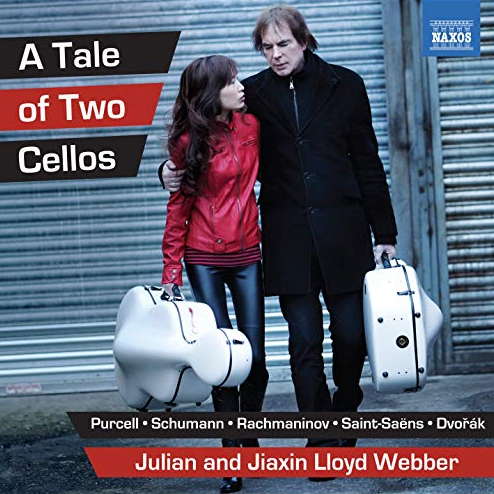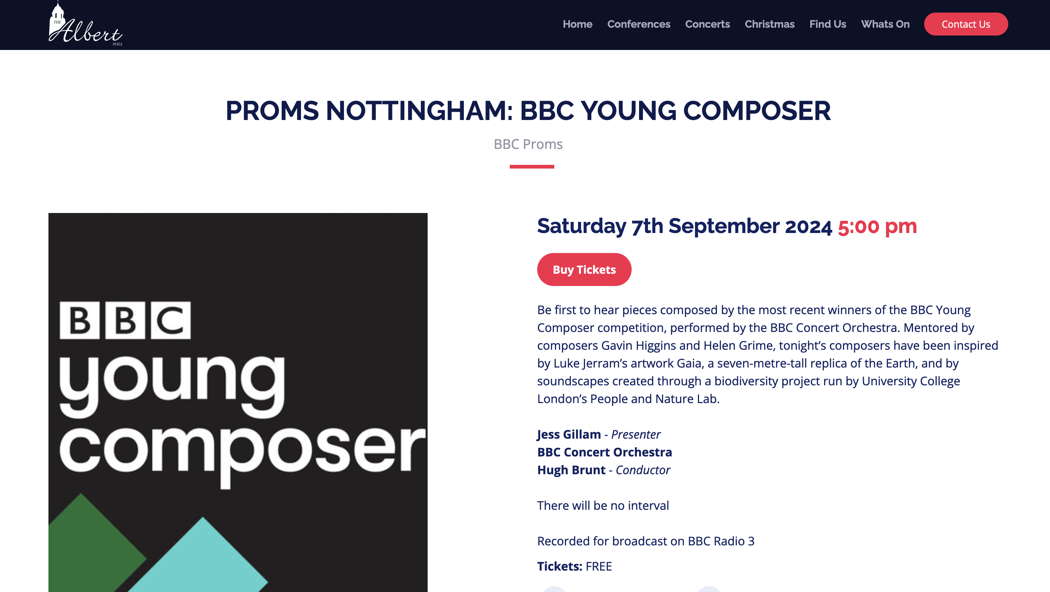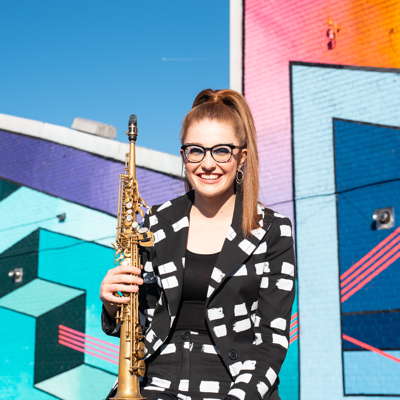- Hamburg
- women composers
- Chris Shultis
- Prince Bob
- classical music genres
- Jacques Ibert
- Ricardo Kanji
- Grupo Corpo
 DISCUSSION: What is a work? John Dante Prevedini leads a discussion about The performing artist as co-creator, including contributions from Halida Dinova, Yekaterina Lebedeva, Béla Hartmann, David Arditti and Stephen Francis Vasta.
DISCUSSION: What is a work? John Dante Prevedini leads a discussion about The performing artist as co-creator, including contributions from Halida Dinova, Yekaterina Lebedeva, Béla Hartmann, David Arditti and Stephen Francis Vasta.
 SPONSORED: CD Spotlight. Uncommon Piquancy - Music for two cellos, heard by Howard Smith.
SPONSORED: CD Spotlight. Uncommon Piquancy - Music for two cellos, heard by Howard Smith.
All sponsored features >>
In Nottingham's Albert Hall
MIKE WHEELER feels privileged to hear works by young composers at a BBC Proms concert in Nottingham
Some years ago, the BBC Proms began staging concerts in different parts of the UK, alongside the regular London season. This year, for the first time, they came to Nottingham, in two concerts featuring the BBC Concert Orchestra, which formed a partnership with the city's two universities - Nottingham and Nottingham Trent - last year.
Did you know that Nottingham has its own Albert Hall? A former church, now a multi-purpose conference centre, it was the city's main concert venue before the Royal Concert Hall opened in 1982, and is still used for concerts, mainly by Nottingham's amateur choirs and orchestras.

Publicity on Nottingham's Albert Hall website for the BBC Young Composer concert on 7 September 2024
The first of the two concerts - Albert Hall, Nottingham, UK, 7 September 2024 - was the culmination of this year's BBC Young Composer competition. Each year, entrants, aged between twelve and eighteen years, are given a starting-point for their pieces, which are workshopped with established composers acting as mentors. This year, with Gavin Higgins and Helen Grime mentoring, composers took their cue from Luke Jerram's art-work Gaia, an eight-metre-wide replica of the Earth, using data from NASA for surface detail; copies have been touring the world since it was created in 2018. Soundscapes inspired by the work of academics at University College London East's People and Nature Lab, and the Biome Health Project, have provided additional resources. Saxophonist and BBC Radio 3 presenter Jess Gillam introduced the concert, and interviewed the composers, and the conductor, Hugh Brunt. All six pieces were commissioned by the BBC, and were receiving their world premieres.

Jess Gillam. Photo © 2018 Robin Clewley
Atharv Gupta's aim in Celestial Awakening was to depict 'the birth of the cosmic body'. Over a soft, low rumble, sprays of woodwind and harp figures led to a soft string theme. Following the central climax, which Gupta identified as the 'Genesis point', a solo oboe was joined by other woodwind, amid flecks of celesta notes. As the piece wound down, we heard the intriguing effect of a dissonant - but serene, not edgy - woodwind line, before the slow fade-out.
In Atmos, Jamie Smith aimed to take 'a holistic view of the earth and what it's all about', with sound-images that 'change and shift in and out of focus'. The piece opened with delicately-scored points of colour, mainly from metal percussion, with added harp. A high, floating solo horn theme, was followed by repeated-note solo trumpet figures, and darker brass surges rising and sinking back. More metal percussion coloured the ending, including the sound of a bowed crotale mounted on one of the timpani (from my seat I was not able to see precisely how), producing, as Smith pointed out, an effect like whale-song - the result of researching extended timpani effects on the internet.
Scored for a smaller orchestra, Reese Carly Manglicmot's Una Voce explored 'the idea of the loss of biodiversity because of human impact'. 'Sounds all over the earth' provided the starting-point, as the piece opened with a veritable dawn chorus of bird-like flute and oboe calls, joined by skittering strings, and ground-swells of low percussion, topped off by more animal sounds from a solo trumpet. Pizzicato strings and bell chimes began the process of the texture thinning out, arriving at a final unearthly stillness that was positively eloquent.
Avram Harris's programme-note describes his piece Ark as 'a short tone-poem envisaging a fleeting journey from the cosmos to our world'. As he commented in his interview, from 'observing all these different habitats' he aimed to 'evoke this whole eco-system that our world is home to', a scenario also summed up in his own poem, printed in the programme. Over a soft bass drum roll, tremolando strings supported oboe, clarinet and flute calls; later, brass roars were added to the many animal sounds evoked. Energetic string figures, with a topping of xylophone, built to a climax, which was stopped in its tracks by a gong-stroke, fading to leave what his note called 'a momentary string quartet of human hope'. A sudden fortissimo eruption brought back the energetic strings, before the piece subsided amid celesta, bowed cymbals and isolated woodwind notes.
Jess Gillam then spoke to conductor Hugh Brunt, who described the opportunity to premiere works by 'six young but incredibly accomplished composers' as 'massively exciting ... They all write with such conviction ... I've so much respect for them'. He stressed the importance of the workshop, describing the opportunities this raised as a luxury, but one the composers really embraced, 'and that really shows in the final pieces'.
Pascal Bachmann's Pale Blue Dot was inspired by the 1990 Voyager 1 photo of Earth, and the poignancy of seeing our planet represented by 'a few small pixels', coupled with the thought that 'every single humen who's ever been born has lived and died on that Earth'. Gillam asked him about his musical influences, and he named Messiaen, specifically his harmonic techniques. Scored for just strings, harp and percussion, his piece is mainly gentle, almost elegiac in mood. Bachmann commented earlier that the temptation with such an orchestra is to write something that's extremely difficult, and he had to restrain himself, and end up writing something that was technically simple. His approach was amply justified by the music's unshowy eloquence.
In Gaia, Advaith Jagannath focused on the 'overview' effect, which he described in his programme-note as 'a transformative sense of awe and unity when viewing Earth from space', contrasting it with 'the struggles of humanity', and realising how fragile Earth is. Asked about his use of solo lines, he said he associated them with the loneliness of earth in space. After the opening solo horn call, a 'restless, uneasy section', starting in the strings, developed in a contrapuntal style, before giving way to a poignant call from a solo trumpet in a side-gallery. Activity built again, leading to a broad, sweeping theme, fading to a terse final cadence.
It was a real privilege to hear the work of these highly promising talents, not least for their remarkable command of orchestral resources. Let's hope they get the support and the opportunities they deserve.
The broadcast is available to hear via BBC Sounds, until 7 October 2024.
Copyright © 12 September 2024
Mike Wheeler,
Derby UK



